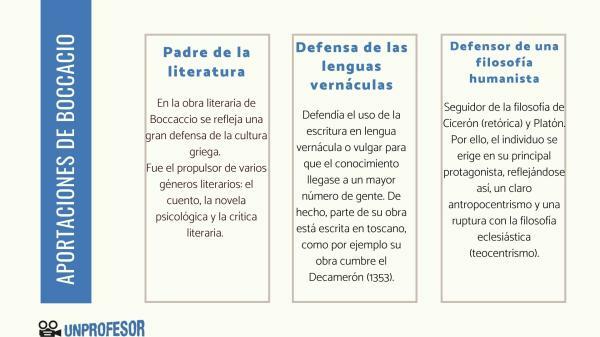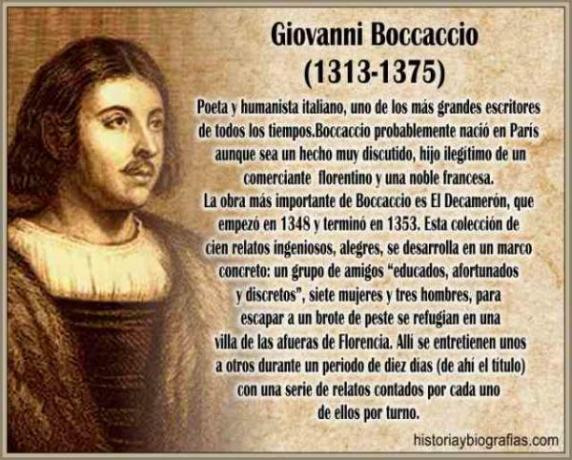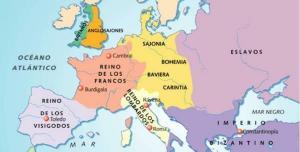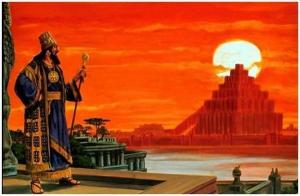Most important CONTRIBUTIONS of Giovanni BOCACCIO

In class today we are going to talk about contributions from Giovanni Boccacio more important (1313-1375), one of the parents of the Humanism and Renaissance literature along with Dante Alighieri Y Francesco Petrarca.
Boccacio, from a very young age began to write and has established himself as one of the most important writers in history with works, such as: The hunt for Diana (1334), La Teseida (1339-1341), Ninfale Fiesolano (1344-1346), Decamerón (1348), El Corbacho (1354), Genealogy Deorum Gentillium (1355) or De Claris Mulieribus (1361-1362).
Likewise, thanks to his literary legacy, his great contributions have come down to us, such as the recovery of classical culture, the development of literary criticismto or the defense of writing in vernacular. If you want to know in more detail the main contributions of Giovanni Boccacio, keep reading because in a PROFESSOR we explain everything to you. Let's start!
Giovanni Boccacio was born in 1313 in the city of Florence, in the bosom of a wealthy family on the part of his father, Boccaccino di Chillin, an important
merchant from the city. Reason why, from a very young age, he received a very careful education by a personal tutor (Giovanni Muzzuoli), however, at the age of thirteen he began to work in the bank of Naples (his father was the director), but due to little interest in banking matters, he began to study law at Naples. Studies that he did not finish. In 1330, his father introduced him to the Neapolitan court, which allowed him to come into contact with great scholars.Shortly before the death of his father, he re-settled in the city of Florence and, it was at this time, that he developed all his literary work, he witnessed the plague and when he became involved with Petrarch. Finally, he died in 1375 in retirement at his home in Florence.
On the other hand, it should be noted that our protagonist's life took place in one of the most important and prosperous cities of Italy in the 14th century, Florence:
- An independent city-state: Self-government with its own republican institutions and where he highlighted the "bourgeois" power against the weakening of the feudal lords.
- Economically very buoyant: With economic independence in the textile trade, in the issuance of own bonds and letters of credit.
- A city where a secular spirit was beginning to be born.

Giovanni Boccacio has bequeathed us around a twenty works, from which we can extract the most important contributions from him. Among which stand:
Father of literature
Boccaccio's literary work reflects a great defense of greek culture and influence of the style of the classics. Something that we observe in his works: The hunting of Diana (1334), The Teseida (1339-1341) or Genealogy Deorum Gentillium (1355).
Likewise, he was the multi-genre propellant literary:
- The story: His masterpiece, the Decameron, is considered the first great Renaissance work and, in addition, with this our protagonist establishes a new way of story (several stories within another story) and served as inspiration to great authors such as Geoffrey Chaucer (1343-1400) in The Canterbury Tales (1387) or William Shakespeare (1564-1616) in Troilus and Cressida (1609).
- The psychological novel: With his work The Elegy of Madonna Fiametta (1343-1344), Boccacio establishes the bases of the psychological novel, since, in this, he delves into the psychology of its protagonist, in his circumstances, in his motivations and in his interior. All this through a monologue in which Fiammetta tells us about her sentimental life and her feelings.
- Literary criticism: Boccacio is the father and creator of literary analysis and criticism as we know it today. And it is that, our protagonist, he carried out a detailed study of the life and work of Dante: he analyzed the work verse by verse and song by song, adding comments and an epithet.
Defense of vernacular languages
Another of the main contributions of Giovanni Boccacio was his great defense of vernacular writing or vulgar so that the knowledge reached a greater number of people. In fact, part of his work is written in Tuscan, such as his work on the summit of the Decameron (1353).
Defender of a humanist philosophy
Our protagonist was a follower of the philosophy of Cicero (rhetoric) and Plato (against the Aristotelian philosophy imposed by the Church). In this sense, we observe how throughout his work the individual stands as the main protagonist of him, thus reflecting a clear toanthropocentrism and a break with the ecclesiastical philosophy (theocentrism).
In this way, Boccacio defends the following maxims of the humanistic philosophy:
- The human being is the center of the universe and superior to any living being.
- The human being is fully qualified and has no intellectual limit.
- The human being is responsible for his destiny.
- Differentiation between individual and God.




